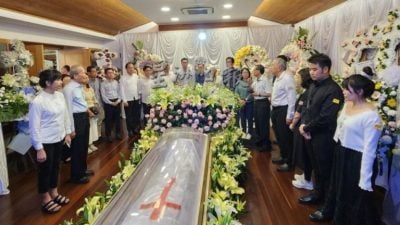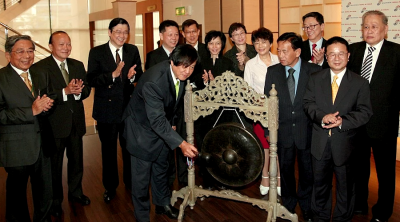
By Mohsin Abdullah
In the African nation of Malawi, two cabinet ministers died on Tuesday 12 January from COVID-19 amid a spike in coronavirus infections.
Within hours after their passing, Malawian President Lazarus Chakwera delivered an address to the nation and declared a state of, no, not emergency, but a state of disaster.
Our condolences to the people of Malawi.
On Tuesday 12 January, US President Donald Trump declared an emergency in Washington D.C. following security concerns over the safety of participants and attendees of President-Elect Joe Biden's inauguration scheduled for 20 January.
Security concerns have been growing after the deadly Capitol riot on 6 January, which many said Trump helped incite.
But the emergency he declared did not stop efforts by the Democrats (and backed by some Republicans) to have him removed from office immediately, i.e. before his term in office ends – either through the 25th Amendment or impeachment.
As I write this, the US House of Representatives has just voted to call on Vice President Mike Pence to invoke the 25th Amendment to remove Trump eight days before his presidential term ends. But Pence has told the House he does not support going the 25th Amendment route.
However, the vote on Tuesday also set for a separate vote the next day on the impeachment of Trump of inciting insurrection after his supporters attacked The Capitol a week earlier.
The point is, it's business as usual for the US House of Representatives despite the emergency declaration. The US constitution does not allow it to be suspended anyway.
And hate him as much as you want, Trump did not stop the proceedings by the House.
Well, he can't anyway, even if he wanted to.
Back home on Tuesday 12 January, a state of emergency was declared. We are told by prime minister Tan Sri Muhyiddin Yassin the reason is to curb the spread of COVID-19.
As we know, detractors and critics of Muhyiddin and his Perikatan Nasional government are expressing their concerns, as a state of emergency gives the prime minister wide and far reaching powers.
In an emergency, the administration, chiefly the prime minister, can do things without seeking approval from the Parliament.
Parliament has not been dissolved, but it will not be sitting during the entire duration of the emergency. With that, check and balance procedures take a back seat, if not totally absent.
Muhyiddin, as expected, has promised no abuse of power and assured the Malaysian people that the emergency is not not a military coup, and that curfew is not about to be enforced and what not.
In short, he has stepped up to dispel alarm among Malaysians.
But critics say if fighting COVID-19 is indeed the objective, an emergency is not necessary as the MCO is good enough and is already in place.
Muhyiddin and his team naturally beg to differ.
But the one thing many, opposition politicians or rakyat alike, agree on is this. They believe the emergency declaration has bolstered Muhyiddin's precarious hold on power and has stalled any attempt by opponents to remove him from office (causing his government to topple as well) either by forcing early election or other means, albeit legal.
It's public knowledge that Muhyiddin's majority support in Parliament has always been wafer-thin, and is thinner now following the withdrawal of support by two Umno MPs. More are said to be ready to follow suit.
Hence, according to the math done by some political observers, Muhyiddin's administration should have (at the most) 110 of the 220 seats in Parliament. There are 220 seats now instead of 222 because two MPs passed away not long ago.
Therefore, many say at best what we have now is a hung parliament while others say the PN government has collapsed based on their calculation.
Whatever it is, one big question is, did Muhyiddin have the locus standi, so to speak, to request for Yang di-Pertuan Agong's consent to declare a state of emergency?
In short, was he the "legitimate" prime minister when he had the audience with the Agong?
For the record, the PM's and his government's legitimacy has always been questioned by many, one of whom Umno's veteran leader Tengku Razaleigh Hamzah.
With regards to Muhyiddin's locus standi or legitimacy as PM in having an audience with the King, it is "a big question mark", according to constitutional expert Professor Aziz Bari.
Aziz said before talking about Muhyiddin's legitimacy and what not, there is an important aspect which must be looked into.
As he sees it, since opposition leader Datuk Seri Anwar Ibrahim has claimed of having majority support, the claim ought to be addressed first.
"In the first place, the Yang di-Pertuan Agong must, as a matter of duty, ascertain whether Anwar has really got the numbers when he claimed he got more than the sitting PM," said Aziz.
The law expert said, "Muhyiddin did nothing to rebut the claim by Anwar."
According to him, the second opportunity to ascertain the claim was in Parliament, but this was "conveniently denied by the Speaker".
Aziz was referring to Speaker Datuk Azhar Harun not allowing motions of confidence for the PM or no confidence against the PM to be tabled in Parliament, citing "government businesses must take precedence".
True, said Aziz, "the government managed to get Budget 2021 through" (which some people say is testimony Muhyiddin had the support of the House) "but it was wafer-thin and the MPs had different considerations".
He opined that Parliament Speaker should have followed what the Perak state assembly Speaker did when he allowed a motion of support for the then Perak menteri besar be tabled, debated and voted.
We know what happened eventually.
But, as things stand, Muhyiddin met the King, who consented to the declaration of emergency. And he is still prime minister.
In justifying the emergency, Muhyiddin said he never had the intention of not having elections. He said the main thing that prevented him from advising the King to dissolve the Parliament to pave the way for general election is the COVID-19 pandemic.
Using Islamic terms, he told Malaysians via live national telecast that the decision not to hold election amidst the ravaging COVID-19 pandemic "is in line with one of the principles of Maqasid Syariah, which is to take care of life or hifz al-nafs".
In this context, said Muhyiddin, it is his duty as the the head of government "to take care of the lives of the people by protecting all from COVID-19 infections" and that "this is the most important task as enshrined and propagated by Islam".
With that in mind, perhaps it would be good for the prime minister to listen to this call that his government must immediately prepare at least RM500 million in assistance to sustain businesses and Malaysians in general over the two weeks of lockdown.
Incidentally, that call was made by Anwar. Never mind that.
The thing is, the prime minister has said he wants to protect the people from COVID-19. But it is not only COVID-19 infections that the people must be protected from. The protection must also be from the economic slump that comes with the COVID-19 pandemic.
Protect people from both and that will really be hifz al-nafs – to take care of lives!
(Mohsin Abdullah is a veteran journalist and now a freelancer who writes about this, that and everything else.)
ADVERTISEMENT
ADVERTISEMENT


































